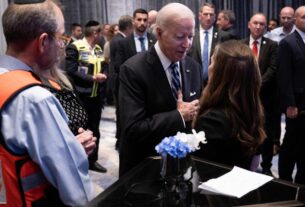((JEWISH REVIEW)) — A progressive Jewish group that participated in a rally in Boston calling for a ceasefire in Gaza, and accusing Israel of “genocide,” is leaving a local Jewish umbrella organization, saying it was told it would be expelled if it did not resign.
The departure of the Boston Workers Circle from the Jewish Community Relations Council of Boston marks a dramatic shift for both groups. The Workers Circle was a founding member of the Boston JCRC in 1944. Meanwhile, the JCRC has until now been fastidiously attached to a “big-tent” approach, allowing groups with staunch and divisive views to remain even in the face of sharp criticism.
In 2019, the JCRC’s executive director, Jeremy Burton, fended off calls to remove the Workers Circle — then called the Workmen’s Circle — from the council after the group signed a statement initiated by Jewish Voice for Peace, an anti-Zionist group. After much discussion, the JCRC’s constituent organizations voted to ban such alliances going forward, and the Workers Circle remained in the coalition.
But the Workers Circle violated that ban when it took part in a rally last Wednesday at Boston’s City Hall Plaza that it organized alongside Kavod, a liberal community group; Jewish Voice for Peace; and IfNotNow, which is harshly critical of Israel and often partners with JVP. The event flier billed it as a message to Massachusetts Sen. Elizabeth Warren that “Boston Jews demand a ceasefire and a stop to genocide.” Several Jewish protesters were arrested following the rally.
Burton said on Tuesday that the Boston Workers Circle’s participation in the rally crossed red lines for his group.
“We appreciate the passion by which BWC expresses its concern for Palestinian safety,” Burton said in a statement, adding that his group shares that concern. But, he added, “we cannot support those organizations that demonize Israel, hold Israel to a double standard, and ignore the safety and security of Israel and our community as a whole.”
Rabbi Rebecca Zimmerman Hornstein, Boston Workers Circle’s executive director, said she had been told — while the rally was still underway — that a discipline process in place within the JCRC would result in her group being kicked off the council. She said she had opted to resign rather than allow that process to unfold.
“In this traumatic time, when everyone’s dealing with so much, it just didn’t seem right to put everyone through a long and arduous process, both our community and the JCRC,” she said.
Leaving the council means that the Boston Workers Circle will no longer be involved when the JCRC crafts policy statements and responses to current events. It also means that the JCRC will have one fewer progressive voice shaping communal affairs.
The Boston JCRC put a different group on the opposite end of the political spectrum through an investigative process two years ago, ultimately determining that the right-wing Zionist Organization of America should remain on the council despite having “elevated white supremacist voices.”
Both the JCRC and the Workers Circle lamented the split and accused the other of being out of touch with mainstream Jewish sentiment.
“It is unfortunate that at a time when we are experiencing and expressing a profound level of Jewish unity across the world, a small minority is seeking to exacerbate fractures and divisions within our people,” Burton said in his statement.
“It’s hard to understand why they see it as worthwhile right now to spend time expelling a founding member, meaning that our voice, which represents kind of a growing portion of the community, will no longer be at the table,” Hornstein said.
The resignation is the second this year for the Workers Circle, founded in 1892 as a Jewish fraternal organization that now promotes Yiddish language and culture along with progressive values. In August, its national organization resigned from the Conference of Presidents of Major American Jewish Organizations, a national umbrella coalition, based on disagreements that included a split over discourse about Israel.




